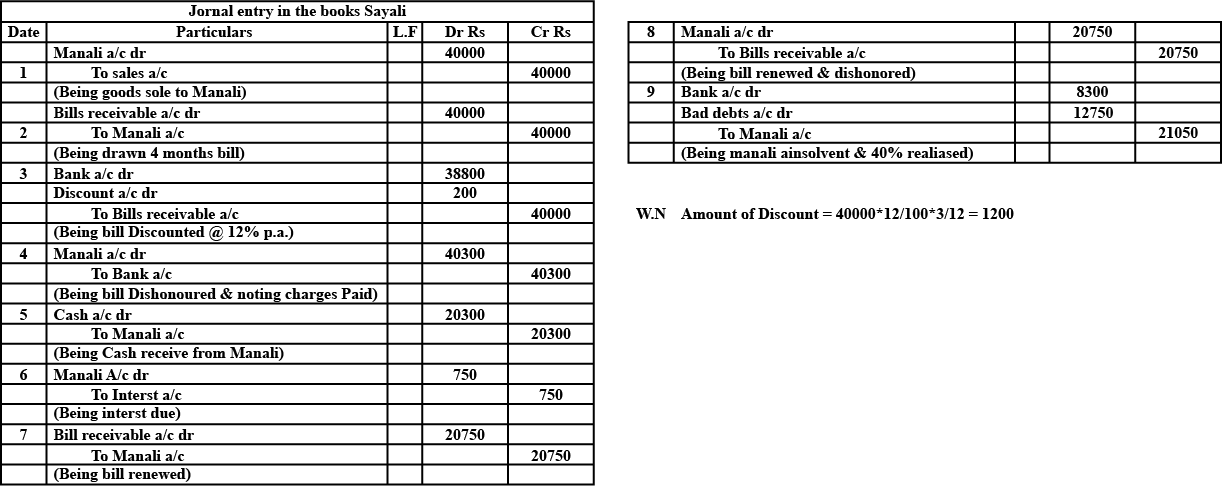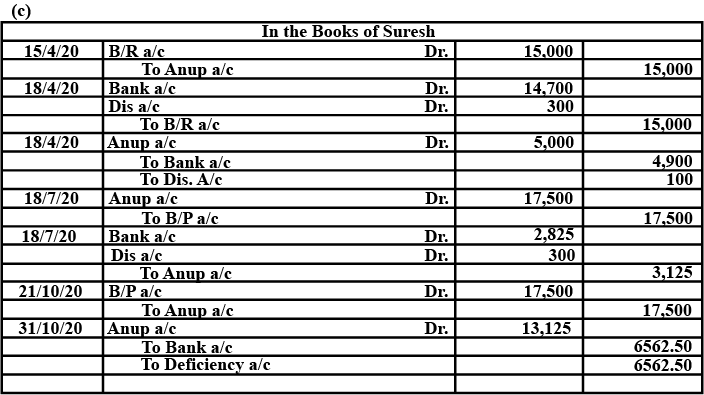Bill Of Exchange - Class 11 Commerce Accountancy - Extra Questions
There are ___________ parties to a promissory note.
What is meant by renewal of a bill exchange?
Briefly explain the effects of dishonour and noting of a bill of exchange.
Ritesh and Naina were in need of funds temporarily. On August $$1$$, $$2010$$, Ritesh drew upon Naina a bill for Rs. $$12,000$$ for $$4$$ months. Naina accepted the bill and returned to Ritesh. Ritesh discounted the bill at the rate of $$8\%$$ per annum. Half amount of the discounted bill remitted to Naina. On due date, Ritesh sent the required sum to Naina, who met the bill.
Journalise the transaction in the books of both the parties.
On November $$1$$, $$2010$$, Sonia drawn a bill on Sunny for Rs. $$15,000$$ for $$3$$ months for mutual accommodation. Sunny accepts the bill and return it to Sonia. Sonia discounted the same with his bankers at the rate of $$6\%$$ per annum. The proceeds are shared between Sonia and Sunny in proportion of $$2/3$$rd and $$1/3$$rd respectively. On the due date, Sonia remits his proportion to Sunny who fails to met the bill and as a result Sonia has to meet it. Sunny give a fresh acceptance for the amount due to Sonia plus interest of Rs. $$100$$ Sunny meet his second acceptance on due date.
Record the necessary Journal entries in the books of Sonia and Sunny.
Vishal sold goods for Rs. $$7,000$$ to Manju on January $$5$$, $$2011$$ and drew upon her a bill of exchange payable after $$2$$ months. Manju accepted Vishal's draft and handed over the same to Vishal after acceptance. Vishal immediately discounted the bill with his bank at the rate of $$12\%$$ per annum. On the due date, Manju met her acceptance.
Journalise the above transactions in the books of Vishal and Manju.
Question: Calculate the amount of bills receivable dishonoured from the following information
| (Rs) | |
| Opening balance of bills receivable | $$1,20,000$$ |
| Bills collected (honoured) | $$1,85,000$$ |
| Bills receivable endorsed | $$22,800$$ |
| Closing balance of bills receivable | $$50,700$$ |
| Bill receivable received | $$1,50,000$$ |
Briefly explain the purpose and benefits of retiring a bill of exchange to the debtor and the creditor.
Sayali sold goods on credit to Manali for Rs. $$40,000$$. Sayali draws a bill on Manali for $$4$$ months for the amount due. Manali accepted the bill and returned it to Sayali. After a month, Sayali discounted the bill with her bank at $$12\%$$ p.a.
On the due date, bank informed that the bill is dishonoured and bank paid the noting charges Rs. $$300$$. Manali requested Sayali to renew the bill. Sayali agreed on conditions that Manali should pay Rs. $$20,000$$ in cash along with noting charges and accept a new bill for the balance amount with interest at $$15\%$$ p.a. for $$3$$ months.
These arrangements were carried through. Before the due date Manali was declared insolvent and only $$40\%$$ of the amount due could be recovered from her private estate as final dividend.
Give Journal Entries in the books of Sayali.
Answer the following questions in 'one' sentence each:
What are Noting Charges?
What is 'retirement of a bill of exchange'?
Find the true discount, banker's discount and banker's gain on a bill of $$Rs. 36,600$$ due $$4$$ months hence at $$5\% p.a.$$
Write a word/term/phrase as a substitute for each of the following statements:
Officer appointed by the Central Government for noting of dishonour of a bill.
Convert:
$$ $2$$ to $$20$$ cents
Suresh draws a bill for $$Rs. 15,000$$ on Anup on $$15^{th}$$ April, $$2020$$ for $$3$$ months, which Anup returns to Suresh after accepting the same. Suresh gets it discovered with the bank for $$rs. 14,700$$ on $$18^{th}$$ April, $$2020$$ and remits one-third amount to Anup. On the due date Suresh fails to remit the amount due to Anup, but he accepts a bill of $$Rs. 17,500$$ for $$3$$ months , which Anup discounts for $$17,100$$ and remits $$Rs. 2,825$$ to Suresh. Before the maturity of the renewed bill Suresh becomes insolvent and only $$50\%$$ was realized from his estate on $$31^{st}$$ October, $$2020$$.
Pass necessary Journal entries for the above transactions in the books of Suresh.
A bill for rupees $$7,650$$ was drawn on $$8^{th}$$ March, $$2013$$, at $$7$$ months. It was discounted on $$18^{th}$$ May, $$2013$$ and the holder of the bill received rupees $$7,497$$. What is the rate of interest charged by the bank?
A bill of Rs.$$60,000$$ payable $$10$$ months after date was discounted for Rs.$$57,300$$ on 30$$^{th}$$ June,If the rate of interest was $$11\frac{1}{4}\%$$ per annum, on what date was the bill drawn?
Darshan sold goods for Rs. $$40,000$$ to Varun on $$8.1.2011$$ and drew upon him a bill of exchange payable after two months. Varun accepted the bill and returned the same to Darshan. On the due date, the bill was met by Varun.
Record the necessary Journal entries in the books of Darshan and Varun in the following circumstances.
$$\bullet$$ When the bill was retained by Darshan till the date of its maturity.
$$\bullet$$ When Darshan immediately discounted the bill at the rate of $$6\%$$ per annum with his bank.
$$\bullet$$ When the bill was endorsed immediately by Darshan in favour of his creditor Suresh.
$$\bullet$$ When three days before its maturity, the bill was sent by Darshan to his bank for collection.
Record the necessary Journal entries in the books of Darshan and Varun in the following circumstances.
$$\bullet$$ When the bill was retained by Darshan till the date of its maturity.
$$\bullet$$ When Darshan immediately discounted the bill at the rate of $$6\%$$ per annum with his bank.
$$\bullet$$ When the bill was endorsed immediately by Darshan in favour of his creditor Suresh.
$$\bullet$$ When three days before its maturity, the bill was sent by Darshan to his bank for collection.
On January $$1$$, $$2011$$, Bhanu and Naman drew on each other a bill for Rs. $$8,000$$ payable $$3$$ months after the due date for their Mutual benefit. On January $$2$$, they discounted with their bank each other's bill at $$5\%$$ per annum. On the due date, each met his own acceptance.
Give Journal entry in the books of Bhanu and Naman.
On January $$1$$, $$2011$$, Vibha sold goods worth Rs. $$18,000$$ to Sudha and drew upon the latter a bill of exchange for the same amount payable after two months. Sudha accepted Vibha's draft and returned the same to Vibha after acceptance. Vibha endorsed the bill immediately in favour of her creditor Geeta. Five days before the maturity of the bill Sudha requested Vibha to cancel the bill since she was short of funds. She further requested to draw a new bill upon her including interest of Rs. $$200$$. Vibha accepted Sudha's request. Vibha took the bill from Geeta by making the payment to her in cash and cancelled the same. Then. she drew a new bill upon Sudha as agreed. The new bill was payable after one month. The new bill was duly met by Sudha on maturity.
Record the necessary Journal entries in the books of Vibha.
Kapil purchased goods for Rs. $$21,000$$ from Gaurav on $$1.2.2011$$ and accepted a bill of exchange drawn by Gaurav for the same amount. The bill was payable after one month. On $$25.2.2008$$ Gaurav sent the bill to his bank for collection. The bill was duly presented by the bank. Kapil dishonoured the bill and the bank paid Rs. $$100$$ as noting charges.
Record the necessary Journal entries for the above transactions is the books of Kapil and Gaurav.
Raja made sales goods worth Rs. 40,000 to Pradhan and received a part payment of Rs. 10,On the same date, Raju drew on Pradhan a three month's bill for Rs. 30,000, received the acceptance on the bill and sent the bill to the bank for collection immediately.
However, on the due date, the bill was dishonoured due to Pradhan's insolvency and only 50% of the amount due could be recovered from his private estate as the first and final dividend.
Give Journal Entries Pradhan's Account in the books Raja.
Class 11 Commerce Accountancy Extra Questions
- Accounts From Incomplete Records Extra Questions
- Bank Reconciliation Statement Extra Questions
- Bill Of Exchange Extra Questions
- Computerised Accounting System Extra Questions
- Depreciation, Provision And Reserves Extra Questions
- Financial Statements 1 Extra Questions
- Financial Statements 2 Extra Questions
- Introduction To Accounting Extra Questions
- Recording Of Transactions - I Extra Questions
- Recording Of Transactions - Ii Extra Questions
- Theory Base Of Accounting Extra Questions
- Trial Balance And Rectification Of Errors Extra Questions

